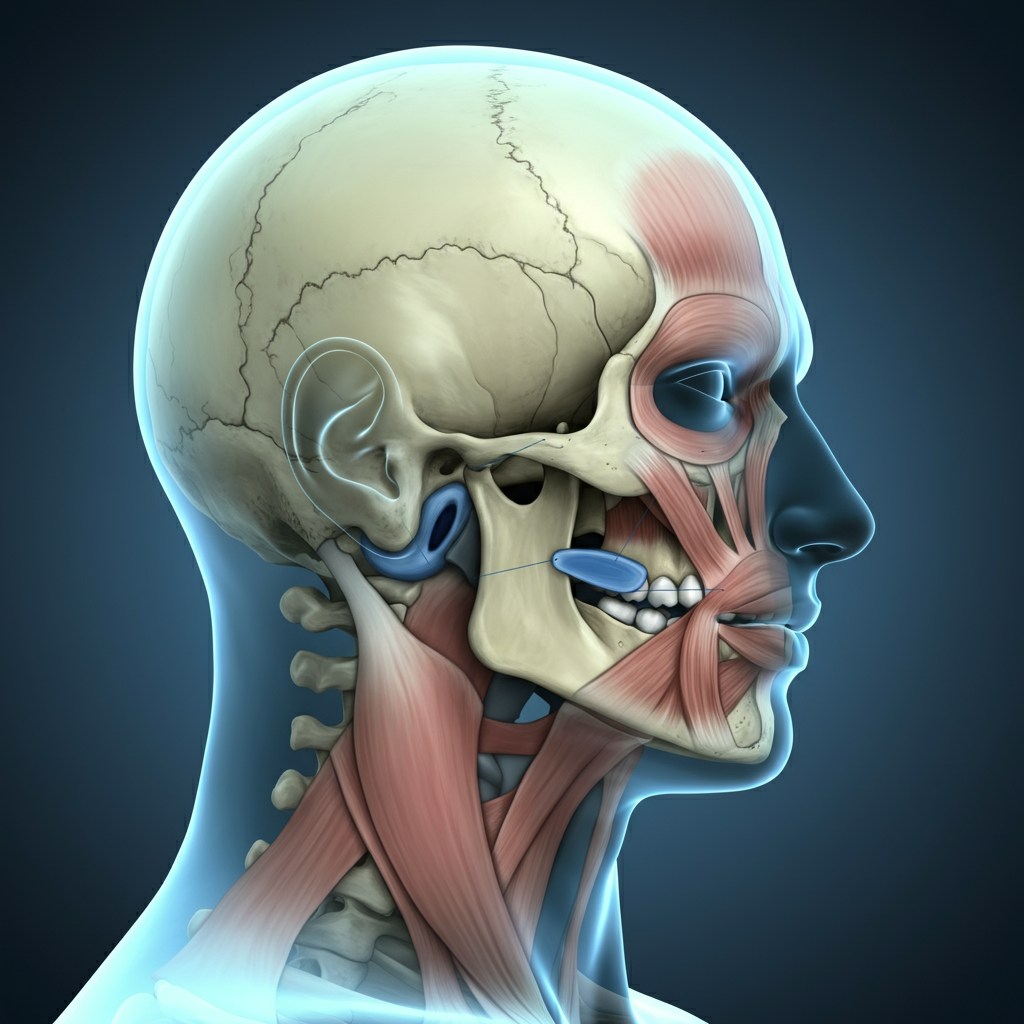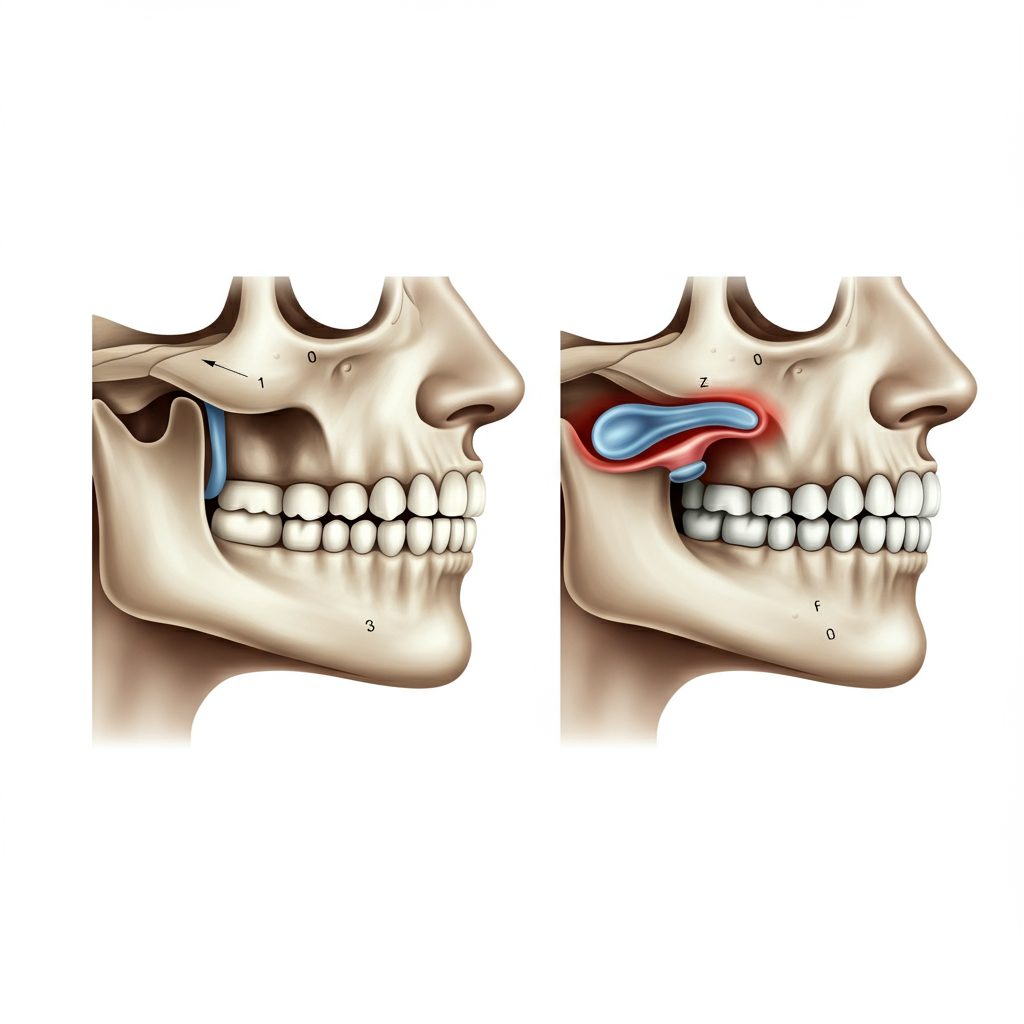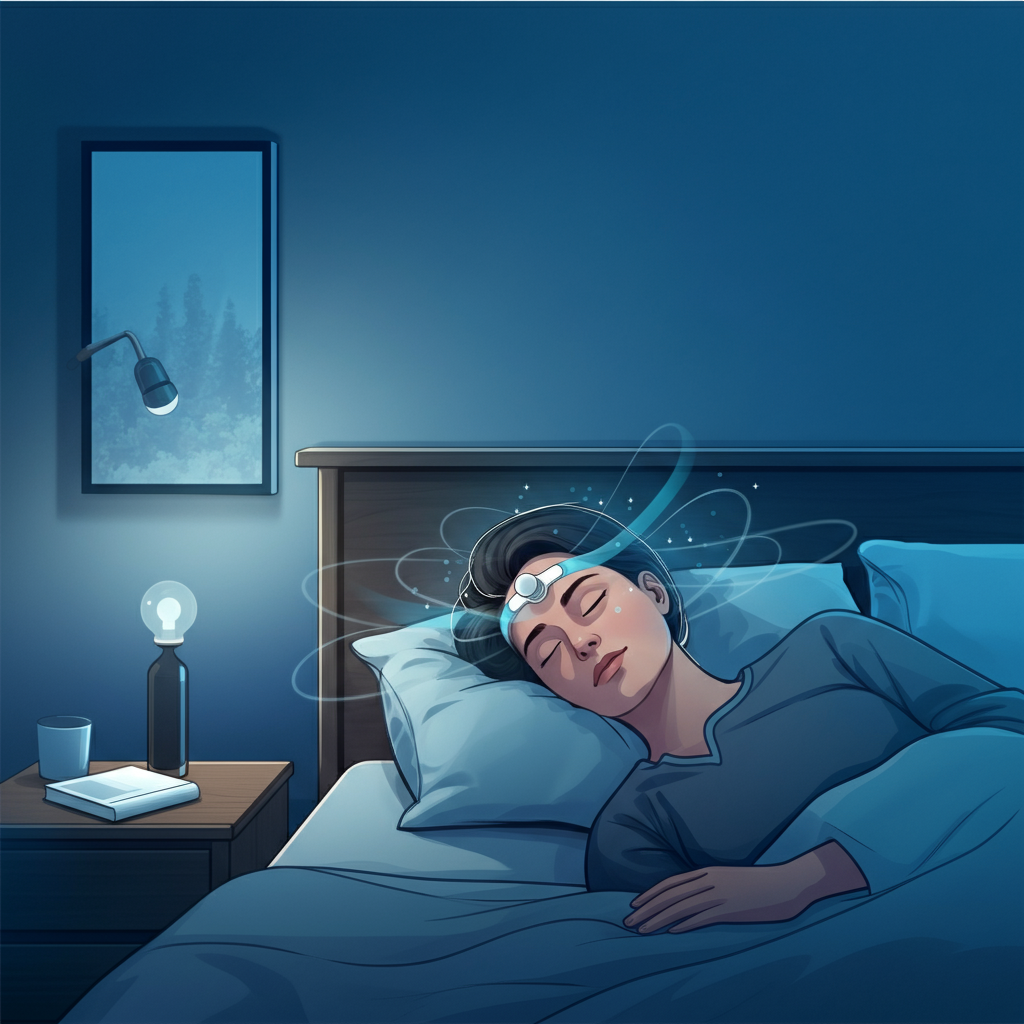TL;DR with Bullet Points:
- What is TMJ Dysfunction?
- A condition affecting the jaw joints, causing pain and discomfort.
- Impacts daily activities like chewing, talking, and yawning.
- Common Symptoms:
- Jaw pain spreading to the face, neck, or shoulders.
- Clicking, popping, or grating sounds in the jaw.
- Headaches, ear pain, or ringing in the ears (tinnitus).
- Difficulty chewing, biting, or a misaligned bite.
- Limited jaw movement or jaw locking.
- Causes:
- Teeth grinding or clenching (bruxism).
- Stress and chronic muscle tension.
- Arthritis (osteoarthritis or rheumatoid arthritis).
- Injury or trauma to the jaw or head.
- Structural issues like misaligned teeth or jaw.
- Treatment Options:
- Self-Care:
- Eat soft foods, avoid extreme jaw movements.
- Use ice/heat packs for pain relief.
- Practice stress management (meditation, yoga).
- Professional Help:
- Medications (pain relievers, muscle relaxants).
- Dental splints or mouth guards to reduce grinding.
- Physical therapy for jaw exercises and mobility.
- Advanced treatments (injections, surgery) for severe cases.
- Self-Care:
- When to See a Specialist:
- Severe pain, persistent symptoms, or jaw locking.
- A doctor or dentist can provide a diagnosis and recommend advanced care.
By understanding symptoms and seeking appropriate care, you can manage TMJ dysfunction effectively.
That clicking sound in your jaw might be more than just a minor annoyance. For millions of people, it’s a sign of temporomandibular joint (TMJ) dysfunction. This condition affects the complex joints connecting your jawbone to your skull, which are essential for talking, chewing, and yawning. When these joints aren’t working correctly, it can lead to significant pain and discomfort that impacts your daily life.
Understanding the signs of TMJ dysfunction is the first step toward finding relief. This post will guide you through the common symptoms, explore the potential causes behind the pain, and outline the various treatment options available to help you manage the condition effectively.
What Are the Common Symptoms of TMJ Dysfunction?
TMJ disorders can present a wide range of symptoms, and they often vary from person to person. While some people experience mild discomfort, others face chronic pain that interferes with their ability to eat or speak. Recognizing these symptoms is crucial for getting a timely and accurate diagnosis.
Jaw Pain and Discomfort
The most frequently reported symptom is pain in and around the jaw joint. This pain can feel like a dull ache that spreads to the face, neck, or shoulders. It might be constant or come and go. Many people notice the pain is worse in the morning, especially if they clench or grind their teeth at night. The discomfort can also flare up when chewing tough foods or opening the mouth wide.
Clicking, Popping, or Grating Sounds
Do you hear a clicking or popping sound when you open or close your mouth? This is a classic sign of TMJ dysfunction. These noises occur when the articular disc—a small piece of cartilage that cushions the joint—slips out of place. While occasional clicking without pain might not be a concern, persistent and painful sounds signal that the joint isn’t functioning smoothly. In more advanced cases, you might notice a grating sensation, which can indicate that the bones are rubbing against each other.
Headaches and Ear Pain
The muscles and nerves around the temporomandibular joint are closely connected to other structures in your head and neck. Because of this, TMJ problems often trigger recurring headaches, which are frequently mistaken for tension headaches or migraines. You might also experience pain in or around your ear, a feeling of fullness in the ear, or even ringing sounds (tinnitus). This is due to the joint’s close proximity to the ear canal.
Difficulty Chewing or Biting
Pain and stiffness in the jaw muscles can make chewing a difficult and uncomfortable task. You might find yourself avoiding certain foods, like crusty bread or chewy candies, because they require too much effort. In some cases, TMJ dysfunction can cause a sudden change in how your upper and lower teeth fit together, making it feel like your bite is “off.”
Limited Jaw Movement or Locking
Another common symptom is a restricted range of motion in your jaw. It may feel stiff, making it hard to open your mouth wide. In more severe instances, the jaw can lock in an open or closed position. This happens when the disc gets stuck, preventing the joint from moving properly. A locked jaw is often painful and can be frightening, requiring immediate attention to resolve.
What Causes TMJ Dysfunction?
Pinpointing the exact cause of TMJ dysfunction can be challenging, as it often results from a combination of factors. Doctors believe that problems with the jaw muscles or the joint itself contribute to the disorder.
Here are some of the most common causes and contributing factors:
- Bruxism (Teeth Grinding and Clenching): Many people unconsciously grind their teeth or clench their jaw, especially during sleep or times of stress. This constant pressure puts immense strain on the temporomandibular joints and the surrounding muscles, leading to inflammation and pain.
- Stress and Anxiety: Emotional stress often causes us to tense our muscles, including those in the jaw, face, and neck. This chronic muscle tension is a significant contributor to TMJ pain and can exacerbate bruxism.
- Arthritis: Just like other joints in the body, the temporomandibular joint can be affected by arthritis. Osteoarthritis, resulting from wear and tear on the joint’s cartilage, and rheumatoid arthritis, an autoimmune disease, can both cause joint damage and inflammation.
- Injury or Trauma: A direct blow to the jaw, face, or side of the head can damage the joint, dislocate the disc, or injure the surrounding tissues. Whiplash from a car accident is another common cause of TMJ-related trauma.
- Structural Problems: Sometimes, the issue lies within the joint’s structure itself. This could be a congenital issue or a problem with the alignment of the teeth and jaw (malocclusion).
Finding Relief: Treatment Options for TMJ Dysfunction
The good news is that many cases of TMJ dysfunction can be managed effectively with conservative treatments. The goal is to relieve pain, restore normal function, and prevent the symptoms from returning.
Self-Care and Home Remedies
For mild to moderate symptoms, simple lifestyle adjustments can make a significant difference.
- Eat Soft Foods: Give your jaw a rest by avoiding hard, crunchy, or chewy foods. Opt for things like soup, yogurt, smoothies, and mashed potatoes.
- Apply Ice and Heat: Use an ice pack on the side of your face for 10-15 minutes to reduce inflammation and numb the pain. You can also use a warm, moist towel to help relax tight jaw muscles.
- Practice Stress Management: Since stress is a major trigger, incorporating relaxation techniques into your daily routine can be very helpful. Try meditation, deep breathing exercises, or yoga.
- Avoid Extreme Jaw Movements: Be mindful of habits like wide yawning, chewing gum, or shouting, as these can strain the joint.
Medical and Professional Interventions
If self-care isn’t enough, it’s time to seek professional help. A doctor or dentist can recommend more targeted treatments.
- Medications: Over-the-counter pain relievers like ibuprofen or naproxen can help manage pain and inflammation. In some cases, a doctor might prescribe muscle relaxants or anti-anxiety medications to ease muscle tension and reduce clenching.
- Dental Splints or Mouth Guards: A custom-fitted oral appliance, often worn at night, can prevent you from grinding your teeth. It creates a physical barrier and helps position the jaw in a more relaxed state, reducing pressure on the joint.
- Physical Therapy: A physical therapist can teach you exercises to stretch and strengthen your jaw muscles. They may also use techniques like ultrasound or transcutaneous electrical nerve stimulation (TENS) to relieve pain and improve jaw mobility.
When to See a Specialist
You should consult a doctor or dentist if your pain is severe, if your symptoms don’t improve with self-care, or if you are having trouble opening or closing your jaw. They can perform a thorough examination, which may include X-rays or other imaging, to accurately diagnose the problem. Depending on the cause and severity, they might refer you to a specialist, such as an oral and maxillofacial surgeon or an orofacial pain specialist, for more advanced treatments like injections or, in very rare cases, surgery.
Living with TMJ pain can be frustrating, but you don’t have to endure it alone. By understanding the symptoms and seeking appropriate care, you can take control of the condition and get back to living a more comfortable life.




